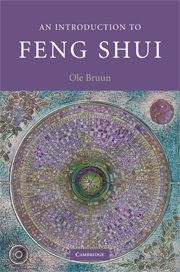Book contents
- Frontmatter
- Contents
- List of illustrations
- 1 Introduction
- 2 A brief history of feng shui
- 3 Feng shui in the context of Chinese popular religion
- 4 Feng shui research
- 5 Cosmological principles, schools of interpretation and the feng shui compass
- 6 Feng shui in the Chinese cityscape: China proper and overseas
- 7 Modern feng shui interpretations and uses
- 8 Environmental concerns
- 9 Feng shui as cultural globalization?
- Bibliography
- Index
4 - Feng shui research
Published online by Cambridge University Press: 05 June 2012
- Frontmatter
- Contents
- List of illustrations
- 1 Introduction
- 2 A brief history of feng shui
- 3 Feng shui in the context of Chinese popular religion
- 4 Feng shui research
- 5 Cosmological principles, schools of interpretation and the feng shui compass
- 6 Feng shui in the Chinese cityscape: China proper and overseas
- 7 Modern feng shui interpretations and uses
- 8 Environmental concerns
- 9 Feng shui as cultural globalization?
- Bibliography
- Index
Summary
This review of Chinese feng shui research can merely embrace a fraction of the studies that have been undertaken across the world. Furthermore, it deals mainly with social science and humanistic studies as opposed to those that may have been done in fields, such as science and medicine. It should also be noted that historical studies are widely used in Chapter 2 and elsewhere, rather than presented here.
Quite similar to other aspects of Chinese culture and religion, feng shui was first investigated by a number of missionary writers, eager to pave the way for the gospel in China. An account of the writers M. T. Yates, Joseph Edkins and Ernest J. Eitel is discussed in Chapter 2 (p. 43). In 1892, the Dutch sinologist J. J. M. de Groot (1854–1921) published his monumental work, The Religious Systems of China (1892–1910), which included the first comprehensive study of Chinese feng shui. In contrast to other contemporary writers, who employed theological perspectives or merely common sense, de Groot's work offered sophisticated ethnographic analysis based on systematic fieldwork combined with study of the classics. J. J. M. de Groot also specifically sets out to answer the familiar question ‘what is feng shui?’, since it ‘holds the nation in its grip and reigns supreme in the empire, through its whole length and breadth’.
- Type
- Chapter
- Information
- An Introduction to Feng Shui , pp. 84 - 99Publisher: Cambridge University PressPrint publication year: 2008

